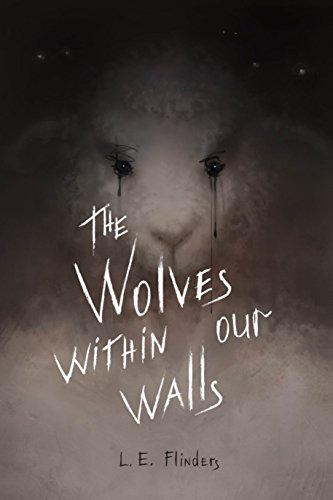The Wolves Within Our Walls received a 4+ star review, making it an IndieReader Approved title.
Following find an interview with author LE Flinders.
What is the name of the book and when was it published?
The Wolves Within Our Walls, July 10, 2017
What’s the book’s first line?
I’m not sure how to start this.
What’s the book about? Give us the “pitch”.
A troubled 28-year-old waitress struggles to choose between an honest reality and the deceptive comfort of familiarity following a catastrophic technology and infrastructure collapse.
What inspired you to write the book? A particular person? An event?
There seems to be a growing belief in our society (and all forms of our media) that there are good people versus bad people, and that the end of civilization and structure as we know it would bring about massive violence, rape, and chaos. I’ve studied human nature for long enough to have a different opinion. I wanted to write a post-apocalyptic novel that shows that our problems in an end-of-the-world scenario would ultimately be the same problems that we have now: fear, selfishness, and apathy. They eat away at our shared humanity in a way that is more gradual. All of our current concerns can ultimately be traced back to those three universal human failings. I also believe that viewing these issues in a world that is not our own allows for the objectivity needed to see what is happening in our world more clearly.
What’s the main reason someone should really read this book?
For anyone filling with fear, hostility, or exhaustion in our rapidly changing and increasingly volatile new world, I’ve done my best to create an escape that still allows for reflection and analysis of many of our current concerns.
What’s the most distinctive thing about the main character? Who-real or fictional-would you say the character reminds you of?
Zoe Wilkes represents the vast majority of us in a way that can be uncomfortable to admit. She is an embodiment of both our failings as a species and our desire to change. She is the part of us that chooses our own comfort and sanity by turning off a news broadcast or staying within a political bubble.She is the part of us that rationalizes not stopping to give food or money to a homeless person on the street because we have someplace we have to be. She is the part of us that fights to believe that we are each one of the “good people” while ignoring the suffering that does not touch our own lives.
When did you first decide to become an author?
I don’t know that I consider myself an author. I write. I’ve always written. It’s mainly something to do with my cats when we can’t sleep.
Is this the first book you’ve written?
This is the first book that I’ve worked on long enough to publish. I’ve abandoned many in the past.
What’s the best and the hardest part of being an indie?
The reputation is both the best and hardest part of being an indie. Indie is the intrigue of underground art shows, dive bar performance venues, and cult classic films. It is freedom from traditional publishing constraints. It is that friend who refuses to watch La La Land or read Harry Potter, or the one who hangs a curb-scavenged velvet painting in her living room. It is ending a sentence with a preposition because you want to. That reputation allows a book to challenge norms, avoid audience-pleasing tropes, and do its own thing. Unfortunately, that same freedom and obscurity also makes finding your ideal audience (and them finding you) extremely difficult.
Would you go traditional if a publisher came calling? If so, why?
N
Is there something in particular that motivates you?
I want to be heard. I also want a good poke bowl on occasion. And cats, I also want an unlimited number of cats.
Which writer, living or dead, do you most admire?
Hillary Rodham Clinton.
Which book do you wish you could have written?
Flowers for Algernon by Daniel Keyes or Mother Night by Kurt Vonnegut.

